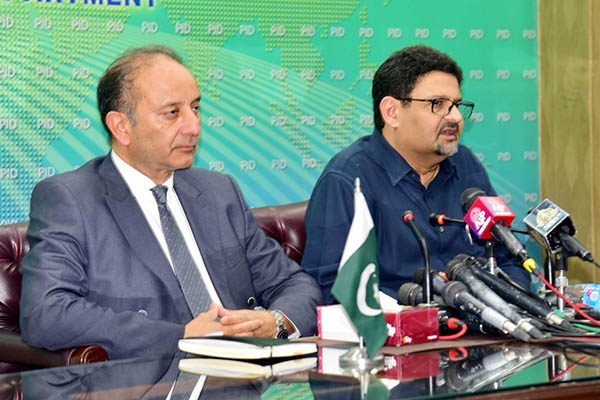
Photo courtesy PID
The government on Thursday night announced yet another increase to the prices of all fuel products, raising tariffs from Rs. 14-19/liter, with Finance Minister Miftah Ismail saying this was necessary to revive a suspended International Monetary Fund (IMF) program.
In a notification, the Finance Ministry said that the new rates reflected the addition of a petroleum levy, which had been at zero for the past several months. In a press conference announcing the new rates, the finance minister stressed that this was a prior action required by the IMF due to the manner in which the ousted Pakistan Tehreek-e-Insaf (PTI)-led government had reneged on signed agreements.
According to the notification, the prices of petrol have been raised by 14.85 percent from Rs. 233.89/liter to Rs. 248.74, which includes a Rs. 10/liter petroleum levy. Similarly, Rs. 5/liter levy has been imposed on high-speed diesel, kerosene and light diesel oil. The new rates for high-speed diesel are Rs. 276.54/liter, up from Rs. 263.31, an increase of 13.23 percent; kerosene oil Rs. 230.26, up from Rs. 211.43/liter, an 18.83 percent jump; and light diesel oil Rs. 226.15/liter, up from Rs. 207.47/liter, a hike of 18.68 percent.
In his press conference, Ismail claimed that the recent price hikes of petroleum products—prices have been raised over Rs. 100/liter in just a little over a month—as well the restoration of the petroleum levy had yielded “substantial progress” in talks with the IMF, which had agreed to increase the program size from $6 billion to $7 billion. According to the assurances given to the IMF, the government plans to increase the petroleum levy to a maximum of Rs. 50/liter, for which it secured Parliament’s approval through the Finance Bill, 2022. The government also plans to increase the tax on liquefied petroleum gas (LPG) from the existing Rs. 4,670/metric ton to Rs. 30,000/metric ton.
In what appeared to be a hint of further price hikes ahead, the minister said the PTI’s agreement with the IMF had called for prices of petrol and diesel to be Rs. 70/liter higher than the current rates, as it had committed to imposing a maximum levy of Rs. 30/liter as well as impose 17 percent GST. He also claimed that the fuel subsidy announced by ousted prime minister Imran Khan had resulted in losses of Rs. 233 billion for the Petroleum Division, which had played a key role in producing Rs. 5 trillion fiscal deficit—the highest ever in Pakistan’s history.
Minister of State for Petroleum Musadik Malik, who was also part of the press conference, hinted that gas prices would rise soon—at a quantum of up to 45 percent. He claimed the incumbent government had been informed that the PTI had changed some laws allowing the Oil and Gas Regulatory Authority (OGRA) to impose new prices within 40 days of determination with or without government approval. This was likely a reference to recent reports that OGRA fixed 45-46 percent increase in natural gas prices on June 3—which would mean that they would automatically go into effect on July 13.
Malik claimed the government’s “tough decisions” had prevented the threat of default. While admitting the price hike would inevitably increase the difficulties of the poor and the middle class, he claimed the situation would have been far worse if the country had moved toward bankruptcy. He claimed the “tough times” would be over in three to four months and then the country would move toward progress.
